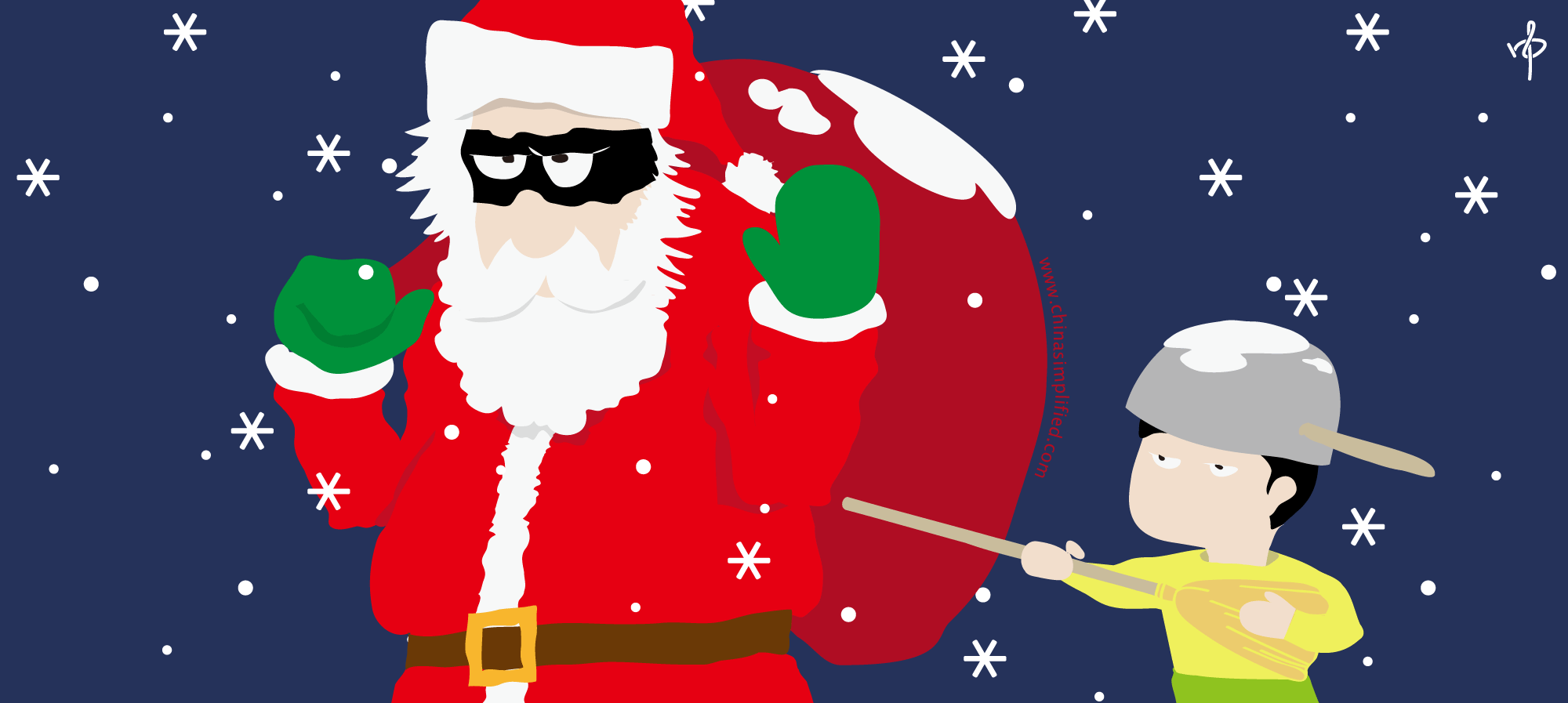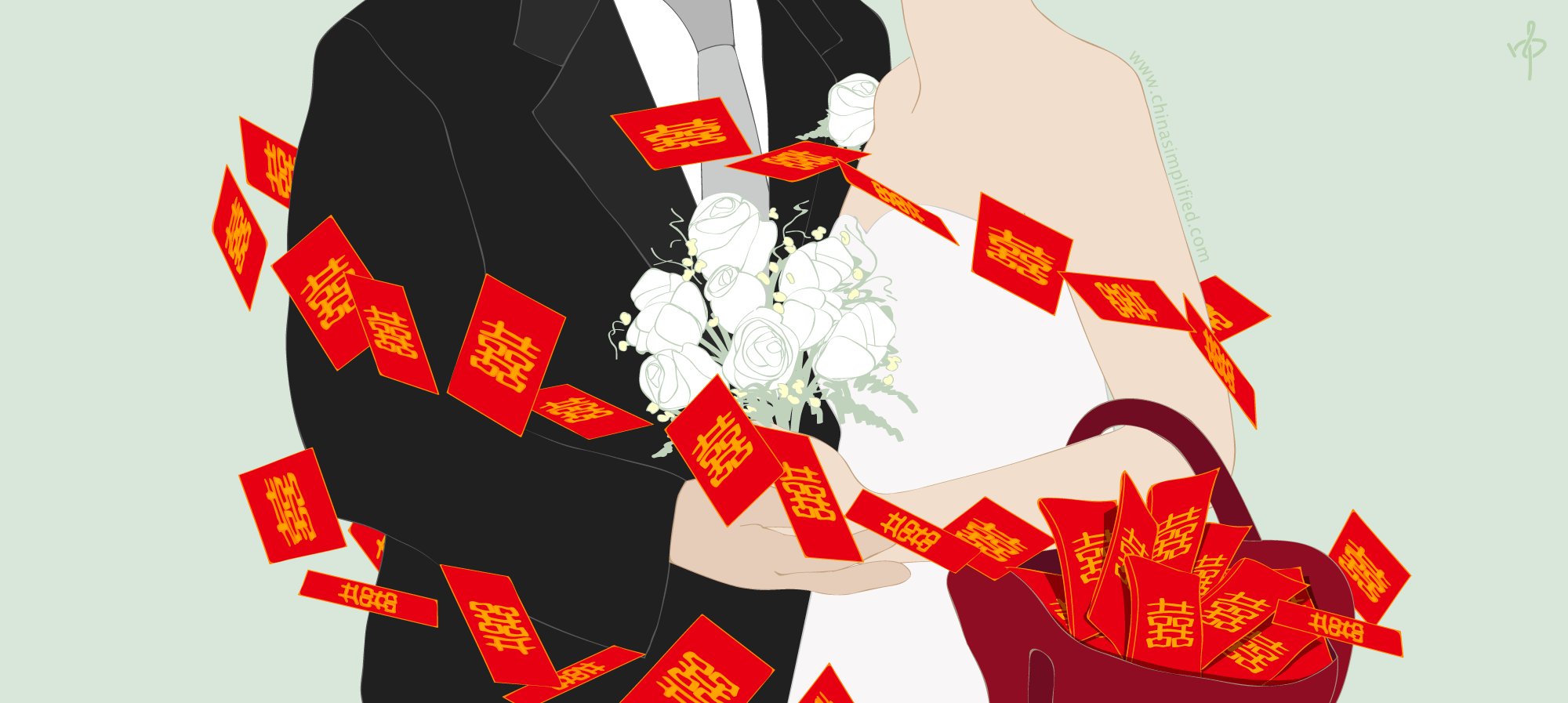For Christians in China, the Christmas holiday is a family-oriented commemoration of the birth of Jesus, not unlike many other places. The majority of Chinese young adults, however, celebrate Christmas in China as a fun evening out with friends and find the legend of the jolly white-bearded man flying around delivering toys to kids somewhat incomprehensible.
“The first image I had of Santa Claus is of him on a roof near a chimney carrying a big bag. To me he looked like a thief. I was wondering how this old man got onto the roof of the house. My teacher at the time told me that he had a sleigh pulled by what I found out later to be reindeers (I thought they were horses). Then I thought, how did he get his sleigh up onto the roof? Later I learned that it’s a flying sleigh! Someone told me that Santa would take other people’s socks and stuff presents in them. So all in all, I thought Santa was a socks thief.”
– male 30s urban professional
The Christmas holiday in the West is a time with family and friends. Airports, train stations and bus stations overflow with people hoping to dodge nasty weather and travel delays to reach brightly-lit homes in time for a festive traditional dinner. In other words, a holiday scene similar to Chinese New Year here in the mainland.
By contrast, Christmas in China, at least in the major cities, is a dining and gifting, nonreligious yet joyful occasion unburdened with the traditional or moral obligations of other holidays. Young Chinese flock with friends to one of many holiday theme decorated shopping malls and restaurants (the feel of Halloween) to enjoy the festivities, exchange gifts (the feel of Valentine’s Day) and celebrate wrapping up the old as well as kicking off the new (the feel of New Year’s Eve). No wonder it’s so much fun.
The Chinese penchant for homophones further instills the holiday with Chineseness. Some people gift an apple (苹果 píngguǒ) to their significant other on Christmas eve (平安夜 píng’ān yè, lit. peaceful night) playing off sound alike ‘ping’ characters in order to wish them smooth sailing (顺利平安 shùnlì píng’ān) in the year ahead. Even a few popular English Christmas carols have catchy Chinese versions:
Ding Ding Dang
(aka “Jingle Bells”)
叮叮当 叮叮当
dīngdīngdāng, dīngdīngdāng
ding-ding-dong, ding-ding-dong
铃儿响叮当
líng’er xiǎng dīngdāng
bells ring ding-dong
我们滑雪多快乐
wǒmen huáxuě duō kuàilè
we are really happy skiing
坐在雪橇上
zuò zài xuěqiāo shàng
riding on a sleigh
December 25th is whose birthday?
The Mandarin name for Christmas (圣诞节 shèngdàn jié) means “holy birth festival,” yet most Chinese remain unaware of the holiday’s religious connotations. This despite Christianity and other religions have made big comebacks since being banned in the early decades of Communist rule.
“I’m told that Mary Magdalene was a virgin. How can this be? I find it hard to believe.”
– female 30s Mandarin teacher
“I first heard of Christmas was when I came to Shanghai in 2003. It’s a young person’s holiday, more cheerful than Spring Festival. I don’t know its origin other than a time for giving thanks.”
– female 20s store manager
According to a Pew Research report, the total number of Christians in China reached 68 million in 2010, which equates to 5% of the population and would rank as the world’s 7th largest Christian country. A BBC news segment suggests that more Chinese attend church on Sunday than do people across the whole of Europe. Some religious experts anticipate, in the not too distant future, that China will boast the largest population of Christians worldwide.
“Christmas gifts are very different from birthday gifts. They’re special because the gifts are from Santa, but I’m not sure if Santa’s real or not because I’ve never seen his sleigh. Henry, my cousin, told me he once saw Santa coming down through the chimney carrying a black bag stuffed with toys and said “Ho Ho Ho!” Henry never lies to me. I hope Santa is real cause I want to meet him.”
– male 7-year-old student
Here’s wishing the white bearded man with the bag of stuff prancing around on your roof isn’t just a sock thief.
Learn more about and keep track of
Upcoming Chinese Festivals and Other Holidays.










I really enjoyed reading this. I think it’s very true that Christmas has become a special holiday that’s unburdened with the traditional or moral obligations of other holidays. I think people in the West need to have a holiday created like that, too!! How about Chinese New Year?! 🙂 Marry Christmas and Happy New Year to you all!